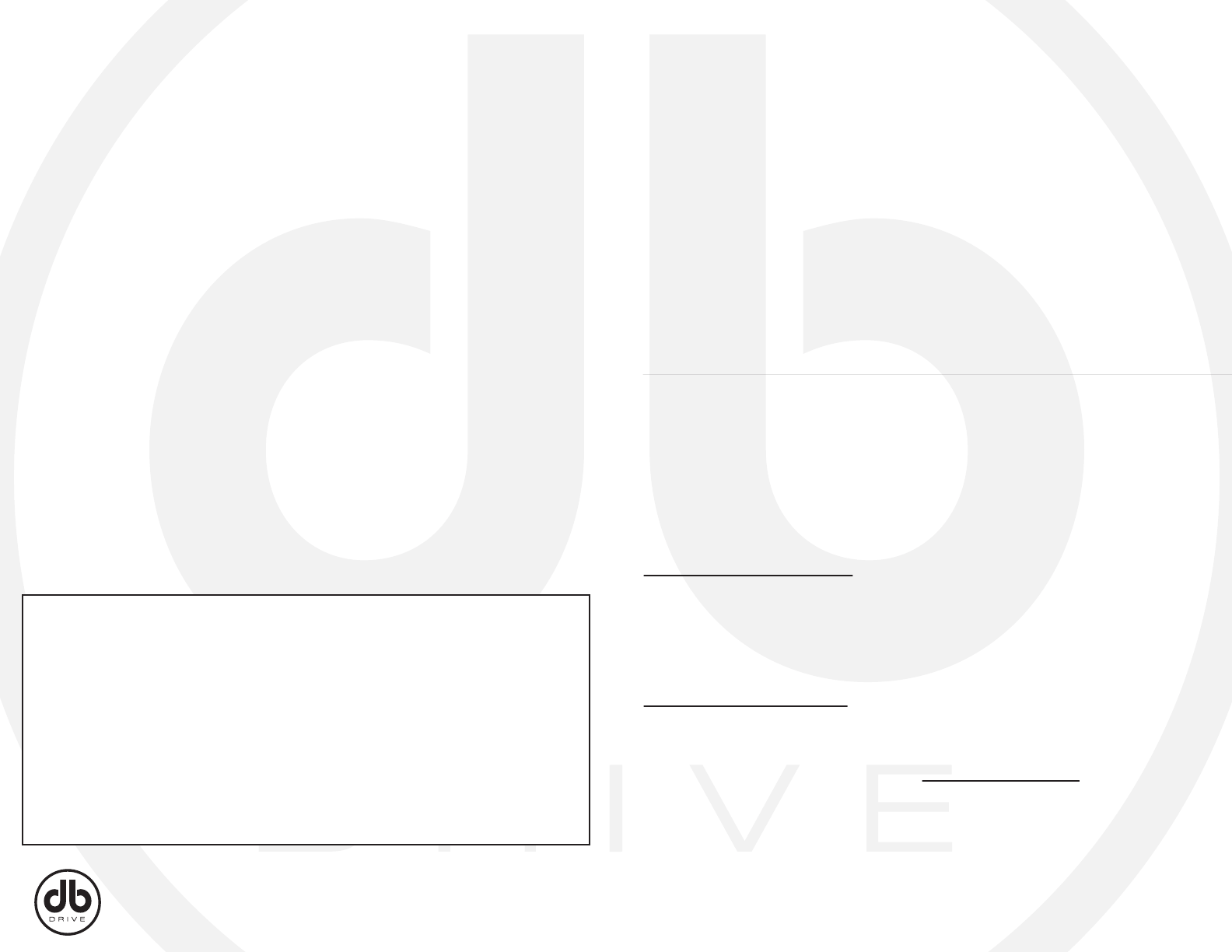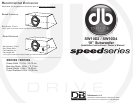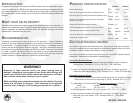
INTRODUCTION
Congratulations on your purchase of a DB Drive state-of-the-art subwoofer compo-
nent. Your selection of a DB Drive car audio product indicates a true appreciation of
fine musical reproduction. Whether adding to an existing system or including a DB
Drive subwoofer in a new system, you are certain to notice immediate performance
benefits.
PRODUCT SPECIFICATIONS
Free Air Resonance.
Total Q of driver @ FS including all resistances only.
Q of driver @ FS including non electrical resistance only.
The driver’s compliance expressed as an equivalent
volume of air (Liters).
The driver’s linear displacement (inches).
The DC resistance of the driver’s voice coil (Ohms).
Thermal power rating of driver (R.M.S./Peak).
Q of driver @ FS including electrical resistance only
The driver’s sensitivity (dB).
KEEP YOUR SALES RECEIPT
Take this time to attach your sales receipt to the manual and put in a safe place. In
case of any unforeseen reason this product may need warranty service, your receipt
will be necessary to establish purchase date. For detailed warranty information
please refer to enclosed warranty card.
RECOMMENDATION
WARNING!
A speaker’s performance is only as good as it’s enclosure. Proper installation,
enclosure size and crossover frequency will maximize the overall performance of
the subwoofer. To properly design and build an enclosure, knowledge of wood-
working as well as the proper tools are required. We highly recommend that you
have your enclosure built by an authorized DB Drive retailer. However, if you decide
to install it yourself, we have included the parameters of each driver and recom-
mended enclosure sizes. If after reviewing the enclosed information you have any
addition questions, please feel free to contact our technical dept.
CALCULATING ENCLOSURES
It is difficult to give exact box dimensions that are universal for all cars and trucks.
It is for this reason that you must be able to calculate the space in which you have
available in order to achieve the proper air volume required.
It is recommended to build your enclosure from 3/ 4” thick MDF (medium density
fiberboard). Make sure the enclosure is sealed airtight.
Calculating External Volume
1.) To calculate box volume, measure the outside Width x Height x Depth of
the enclosure. Example 12” x 14” x 9”=1512 ÷ 1728” Cubic feet
2.) Next you must convert cubic inches into cubic feet. To do this, you must
divide the cubic inches total by 1728”. Example 1512 ÷ 1828=.875 Cubic feet
Calculating Internal Volume
1.) To calculate the internal (net) volume of the above box you must first multiply
the thickness of the wood you are using by Two(2). Example 3/4” x 2= 1.5“
2.) Next subtract 1.5 from each of the outside measurements of the box.
Width Height Depth
12 - 1.5 = 10.5 14 - 1.5 = 12.5 9 - 1.5 = 7.5
3.) Multiple the new totals (H x W x D) Example: 10.5 x 12.5 x 7.5 = .5696
4.) Next you must convert cubic inches into cubic feet. To do this, you must
divide the cubic inch total by 1728”. Example 984.375 ÷ 1728=.5696
cubic feet.
Exposure to high pressure levels can cause hearing loss or
damage. Listening to your system at loud levels while driving, will
impair your ability to hear traffic sounds and emergency vehicles.
Use common sense when listening to your system.
While installing your subwoofer enclosure in the vehicle. Securely
fasten it to the frame or floorpan. If the enclosure is not secured
properly, there is danger of it becoming a projectile in a collision.
Due to continuing product improvement, specications and design are subject to change without notice.
(FS)
(Qts.)
(Qms)
(VAS)
(Xmax)
(Re)
(Pe)
(QES)
(Sens)
37.5Hz
0.53
10.8
26.16L
.33
3.8Ω
250/500
.56
86dB
41.2Hz
0.57
10.47
26.30L
.33
7.23Ω
250/500
.61
86dB
SW10D2 SW10D4
SW10D2 / SW10D4




